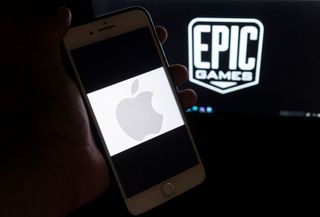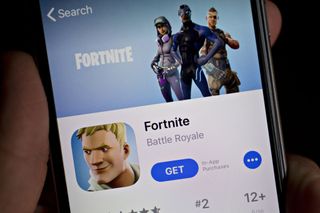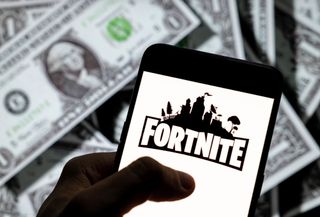The core of Apple's fightback against Epic
"Epic seeks to compromise the security and privacy of iOS users—including children—so that it may sell more V-Bucks."

Last year, Epic Games intentionally broke its developer agreement with Apple by putting its own payment processing system in the iPhone version of Fortnite, bypassing Apple's 30% fee and giving players a V-bucks discount. Apple responded by kicking Fortnite off the iOS App Store, at which point Epic launched a well-prepared PR campaign declaring the iPhone maker "anti-competitive," alongside a big old lawsuit. Corporate war: begun.
Over the past year the companies have exchanged barbs, most notably Epic CEO Tim Sweeney, who has dedicated parts of his week to jabbing away at Apple on Twitter. The hearing took place in May, with a verdict expected later in the year. Apple's counter-filing to Epic's claims, submitted to the court on May 3, 2021, has been released. This is obviously one side's perspective, and is designed to make Epic's claims look as ridiculous as possible, but it certainly does a good job of that. Nevertheless, bear in mind that what you're about to read is Apple's position, and not that of the court. And fair warning: there's a lot of legal jargon to come, though I'll translate it into plain English as much as possible.
The document is entitled "Defendant Apple Inc.'s proposed findings of fact and conclusions of law", and was submitted to the California court before the proceedings, with the trial being overseen by the Honorable Yvonne Gonzalez Rogers.
First of all, Apple points out just how much Epic has benefitted from the former's proprietary technology and platform, not just in terms of money made but also due to the basics of functionality and security. "Epic has benefited handsomely from its contractual relationship with Apple, which goes back to 2010. Epic has used Apple’s proprietary SDKs, and thousands of proprietary APIs, to develop games for iOS users. During the two years that Fortnite was available on the App Store, Epic earned more than $700 million in revenue from iOS customers."
$700 million over two years is a stunning amount of money for one game on one platform over two years, not least when you consider that iOS users were always a fraction of Fortnite's overall playerbase. The filing goes on to give Apple's perspective on what happened when it refused Epic a 'sweetheart' deal on commissions.

"Epic objects to paying Apple a 30% commission—even though it pays the same commission to many other platforms on which Epic distributes Fortnite. When Apple refused Epic’s request for a special deal, Epic included secret code in a Fortnite update and triggered it, using a server-side 'hotfix,' to allow iOS customers to purchase V-Bucks without paying Apple’s commission. This was a breach of the DPLA (as Epic concedes), so Apple terminated Epic’s developer privileges and removed Fortnite from the App Store."
"This was all part of a pre-planned media strategy called 'Project Liberty.' Epic retained Cravath, Swaine & Moore LLP and a public relations firm in 2019, and this lawsuit is the culmination of that effort. Epic seeks to portray Apple as the 'bad guy' so that it can revive flagging interest in Fortnite. Yet, ironically, when Epic got kicked off the iOS platform, it told players that they could continue playing on consoles, PCs, and other devices— demonstrating the existence of competition and the absence of monopoly [...] Epic just wants to free-ride on Apple’s innovation."
The biggest gaming news, reviews and hardware deals
Keep up to date with the most important stories and the best deals, as picked by the PC Gamer team.
The Epic PR campaign
The claim goes on to establish why Apple designed iOS in the way it did, quoting the late co-founder and CEO Steve Jobs: “[w]e define everything that is on the phone. You don’t want your phone to be like a PC. The last thing you want is to have loaded three apps on your phone and then you go to make a call and it doesn’t work anymore. These are more like iPods than they are like computers.” The point being that the 'closed garden,' from Apple's perspective, is a way to guarantee device security and stop malware: something that the company points out is arguably even more important on a phone than on a PC, due to the amount of personal data on such devices.
Apple's lawyers go on to write about the differences between traditional methods of buying a game versus iOS (and manage to make going to a shop and buying one sound like some sort of nightmare), with some historical digression into Epic's own past as a publisher, quoting the very Tim Sweeney himself on the problems with the 'old' distribution model: “[T]he whole business was so daunting. See, you put a huge amount of effort into developing a program. If you have to release it, then that’s basically doubling the effort, because of all the polish and documentation that’s needed. And unless you're going to make serious money from that, then it's not worth it.” They also point out that Epic charged developers a 60% commission, which is not really relevant as physical distribution is a whole other ball game, though it is amusing that Sweeney at the time called this "a fairly favorable royalty for developers."
Apple then really gets into the weeds of how Epic managed its PR campaign. Epic established a 501c4 organisation (essentially, a nonprofit pressure group) which "by design [was] under the control of Epic and its leadership team. The purpose of establishing a separate organization was to create a 'sympathetic' public face. 'Epic is not sympathetic.' Smaller developers, Epic concluded, 'are sympathetic.'"
So Epic created the Sustain Campaign, a 'messaging' initiative “to ensure we’re not the only voice” because, “[w]hen it comes to the press, that results in more neutral to positive coverage [...] First, Epic would continue its efforts to 'seed' the press and 'run ads' to “help establish our position.”

Apple then quotes Epic itself on this strategy: it set out with "traditional public relations where we use the press to apply pressure and drive support [and would] follow a two-week cadence where we create news through an inflection point [...] and then generate continued press on that point through a 14-day trail."
Apple asserts that Epic would use "Paid Media Efforts" as part of this plan, "like a 'game-changing supporter list' to 'influence the general public.'" Apple doesn't provide further explanation for how such a program worked, so we're left to wonder exactly how this allegedly functioned. Apple adds that Epic also created a petition drive 'to suggest the public supported its efforts.'"
In either case, the inevitable removal of Fortnite helped shift the narrative from Apple versus Epic towards Apple versus consumers. That is, according to Apple, Epic tried to paint Apple as standing in the way of cheaper prices for players.
Interestingly enough, Apple initially offered Epic the chance to return to the App Store, giving it 14 days to resubmit Fortnite without the offending code. "Epic instead twice resubmitted Fortnite for review, first on August 20 and again on August 25. Both of these Fortnite versions continued to avoid Apple’s IAP. Consequently, Apple terminated Epic’s Developer Program account, as well as its Developer Agreement and DPLA with Apple, on August 28, 2020."

One of the most amusing things about this document is that, obviously, there are certain things lawyers can and cannot say. But there are ways around it, such as the following quote, by an anonymous author, which is one of many showing a negative public reaction to Epic's moves (included to show that Epic's "public support" is not as widespread as it claims).
"As for the main thrust of [Sweeney's] ‘game consoles are different’ argument, it is undeniably true that Apple makes a lot of money from iPhone and iPad hardware sales. And Google effectively makes most of its money, across its entire business, from ads. But ‘Apple makes enough money from hardware and Google makes enough money from ads’ does not a compelling argument make, unless you’re a pretty hardcore anti-capitalist, and Tim Sweeney does not exactly seem like an anti-capitalist. And in terms of the law, it seems generous to even call it dubious. It tastes like weak sauce even by the standards of sauce obtained from The Weak Sauce Store.”
Nevertheless, Project Liberty remains ongoing. Since August 2020 Epic has held a weekly meeting about its progress and the ongoing PR war.
Bad Logic
Apple's lawyers then turn the cannon towards Epic's experts. One Dr. Evans advanced a hypothetical monopolist test ('HMT') that "purports to show that iOS operating systems and iOS app distribution are a relevant antitrust foremarket and aftermarket, respectively." This is a claim that the App Store is both a monopoly for distribution (foremarket, upfront costs) and a monopoly after release (IAPs). HMT's are usually applied in corporate mergers, and "conducting an HMT for two-sided platforms—like smartphone operating systems, app distribution, and in-app purchase payment processing—is much more complex, and requires multiple inputs that may be difficult to estimate."
Essentially, Apple is saying that Epic's expert has applied a tool that is not capable of dealing with the complexity of a transaction platform like the App Store. There's a lot of talk about how "indirect network effects create feedback loops" and the knock-on effects that are difficult to calculate, but most notably "There is no consensus among economists about how to design HMTs to properly account for these indirect network effects [but] even assuming Dr. Evans’s method is correct, the opinions he offers in this case do not meet his own standards. In his own academic work, Dr. Evans has acknowledged that a double-sided SSNIP test [a method of establishing whether a hypothetical monopolist could get away with small price increases] should include simultaneous testing of both sides of the market using at least 14 inputs. He has not followed that methodology here."
This section goes on and on, and continues to make the point that Dr. Evans says one thing in his research but, as part of Epic's case against Apple, has not followed his own advice: "Dr. Evans does not perform any actual SSNIP calculations testing both sides of the market simultaneously, as required by his own research [...] none of Dr. Evans’s tests use the minimum 14 inputs required by his own methodology."
It gets pretty savage at times ("This test suffers from several critical conceptual and methodological flaws and should be disregarded.") Apple's lawyers even apply the ultimate side-eye to his work by putting quotation marks around the word "test" when discussing them. This section concludes by outlining various flaws in Dr. Evans's analysis of the App Store and iOS, such as treating the operating system as distinct from the phone (Apple makes the point it does not sell or license iOS separately: you get it by buying an iPhone), and saying that basically the math is bad: "Dr. Evans’s model concludes that that Apple has left nearly a billion dollars on the table in 2019 alone—a conclusion that conflicts with a key assumption underlying economic theory that firms maximize profits. More likely is that Dr. Evans’s calculation and conclusion are simply incorrect."
Analysing one of the tests, the lawyers make the fairly good point that Dr. Evans "reaches the absurd conclusion that Apple is an actual monopolist, but has failed to choose the profit-maximizing price."

Epic's experts, perhaps surprisingly, cite the Chinese market as an example of a competitive field, featuring a multitude of app stores. Apple's response again has to do with security, and points out just how bad things are in China on Android. "A 2020 report showed that the top three stores worldwide where users were most likely to download malware were all from China and heavily used by Chinese users [...] As far back as 2013, studies have shown that the fragmentation in China’s Android market due to the 'little control Google has over it' has resulted in 'nearly 35 percent of the Android apps . . . secretly stealing user data unrelated to the app’s functionality.'"
This matters because what Epic is ultimately asking for is a more open iOS which Apple has less control over. "Epic’s proposal would also undermine Apple’s customer-first principle. Apple thinks holistically about the consumer experience and promote consistency across Apple devices. Epic’s proposed relief would create a fractured environment, forcing consumers to use potentially dozens of different payment processors across various apps and devices instead of IAP—a single, secure solution in which consumers have learned to trust."
During the preliminary injunction stage, the court had observed that Epic's claims are “at the frontier edges of antitrust law.” Apple's lawyers write "The corollary to that observation is that in the heartland of antitrust law—as interpreted and applied by the Supreme Court and the Ninth Circuit—Epic’s claims are without merit [...] each of Epic’s liability theories would require this Court to depart from established principles of antitrust law."

The document goes on to give a potted history of the iPhone and other Apple products, and lays out that Apple does not enjoy a monopoly over game distribution by simply citing a bunch of other places where you can buy games. Apple says that: "Epic’s monopoly maintenance claim is premised on the notion that the antitrust laws preclude Apple from imposing conditions on the licensed use of its intellectual property, and impose on Apple a duty to deal with Epic on the terms preferred by Epic—to the detriment of other developers and consumers alike. But Apple has no obligation to license its intellectual property, and aside from a limited exception not applicable here, businesses are free to choose the parties with whom they will deal, as well as the prices, terms and conditions of that dealing."
This next quote amounts to: Epic says Apple should let Epic install what it wants on iOS, and if Apple refuses Epic defines that as anti-competitive.
"Epic’s essential facility claim relies on a theory of liability—denial of essential facility—that has never even been recognized by the Supreme Court [...] Epic’s essential facility claim asks the Court to be the first to hold that Section 2 requires innovating firms to make their innovations available to competitors on whatever terms competitors demand."
"Far from protecting competition, Epic’s calculated media and legal 'Project Liberty' campaign—including its surreptitious implementation of an undisclosed 'hotfix' to intentionally and knowingly deprive Apple of revenue that Epic agreed to pay—arises out of its disagreement with the terms of a license agreement with Apple. At bottom, Epic is asking this Court to force alternative terms on Apple so that Epic can make more money."
The core of Apple's argument is that this is not an antitrust case at all, but a case where a competitor is seeking to use antitrust laws in a way that the US courts have never recognised: that is, if Epic wins this case, that decision would go against what the lawyers describe as a "mountain of precedent" and prohibit Apple from choosing who it deals with and on what terms. "Basic antitrust principles prohibit such a claim except in the narrow circumstances already addressed above."

In another amusing aside, Apple's lawyers note that even Epic doesn't seem too confident about its initial reliance on antitrust law. "In fact, Epic appears to have (rightfully) abandoned this theory of liability. None of Epic’s experts mention the theory at all, much less provide analytical or economic support for the theory. And Epic’s own lead economist states that the allegations here should be characterized as tying or as a conditional refusal to deal, apparently disclaiming essential facility as a viable theory of liability. Thus, along with having no basis in the law, Epic’s essential facility claim has no support in the record."
In other words, "Epic asks the Court to break new ground—or perhaps more accurately, return to the stone age of antitrust law—and invalidate as per se unlawful Apple’s business practices. But the practices challenged here are light years away from being properly categorized as per se anticompetitive."
If you haven't had enough legal jargon by now, here's a beauty. One of Apple's defenses is 'equitable estoppel', which in plain English means that a party cannot claim the benefits of a contract while simultaneously attempting to avoid the burdens that contract imposes. Which does seem like what Epic is doing here, behind all the smoke, and indeed at the hearing on October 19, 2020 the Court described Epic's request for relief as "pretty broad and pretty vague" and asked Epic to specify what remedies it seeks and furthermore, given that Epic is "seeking for [the Court] to in effect dismantle the platform, then [the Court] want[s] to know again in advance where that authority comes from and to the extent that there are other courts that have imposed such sanctions or such remedies, [the Court would] like to have copies of those orders."
That's a judge's way of saying: whoa, Nelly.
It’s the application of brick-and-mortar retail 30% markups to digital transactions that isn’t sustainable. Since Epic undertook this new 12% fee model, Valve dropped to 20% for big games, Apple and Google to 15% for small ones, Microsoft Windows to 12%. Times are changing. https://t.co/yfMJdXtXjJAugust 5, 2021
This is because the consequences would go so far beyond whatever injuries Epic claims it has suffered. It's here that we arrive at some of the most striking lines in the whole 325 pages. Were the Court to give Epic what it wants, this would preclude Apple "from enforcing its longstanding prohibitions against apps containing pornography and other offensive content, as well as apps that may carry malicious code or spyware. In other words, Epic seeks to compromise the security and privacy of iOS users—including children—so that it may sell more V-Bucks on terms of its own choosing," according to Apple.
Sadly there are a few redactions in this document, and here's one of the biggies. "As compensation for Epic’s breach of contract and its breach of the implied covenant of good faith and fair dealing, Apple is entitled to [REDACTED] in compensatory damages, plus 30% of any additional revenue taken in by Epic from iOS users using Epic’s alternative payment function from November 1, 2020 through the date of judgment."
So: Apple wants compensation for the breach, it wants the 30% it was entitled to from Fortnite transactions, and it wants full costs to boot. As the lawyers end by pointing out, "Epic could have litigated its antitrust claims without breaching its contract with Apple. Epic’s deliberate decision to breach first and then bring suit—all part of its coordinated marketing strategy—makes all of Apple’s costs of defense covered by the contractual indemnification provision."
I'm going to reiterate that this is an argument made by Apple, through excellent lawyers, and thus does not represent Epic's position with any favour: the whole point of these things is to make the other side look bad. Nevertheless, it's clear that Epic has done a pretty good job of making itself look bad, and certain of the things that Apple's lawyers have picked up on do show bad faith behaviour: in particular, Epic's unilateral decision to go to war by circumventing Apple's developer agreement, and the subsequent launching of a comprehensive PR campaign that undoubtedly has elements of astroturfing to it.
The trial took place over May 3 to May 24, with a verdict expected later this year. Here's everything we know about the case, and it's also worth remembering that this is just one of many actions that Epic is taking globally against not just Apple, but Google too. Whatever the outcome, Epic's battle against 'walled gardens' is going to run and run.
Correction: A previous version of this story stated that "Basically, some of the people who are publicly backing Epic's position are doing so because they're being paid to do so." It's unclear from the legal filings whether or how astroturfing took place on Epic's behalf in its legal pursuit against Apple. We've edited this section of the story to identify the lack of clarity about this claim made by Apple.
Rich is a games journalist with 15 years' experience, beginning his career on Edge magazine before working for a wide range of outlets, including Ars Technica, Eurogamer, GamesRadar+, Gamespot, the Guardian, IGN, the New Statesman, Polygon, and Vice. He was the editor of Kotaku UK, the UK arm of Kotaku, for three years before joining PC Gamer. He is the author of a Brief History of Video Games, a full history of the medium, which the Midwest Book Review described as "[a] must-read for serious minded game historians and curious video game connoisseurs alike."

Yakuza/Like a Dragon creator Toshihiro Nagoshi says his studio's new game won't be that big after all: 'it's not modern to have similar experiences repeated over and over again'

'Calm down!' says Facepunch Studios: Garry's Mod successor s&box is getting a fan-requested sandbox mode and an alternative to 'Sausage Men'
Most Popular





